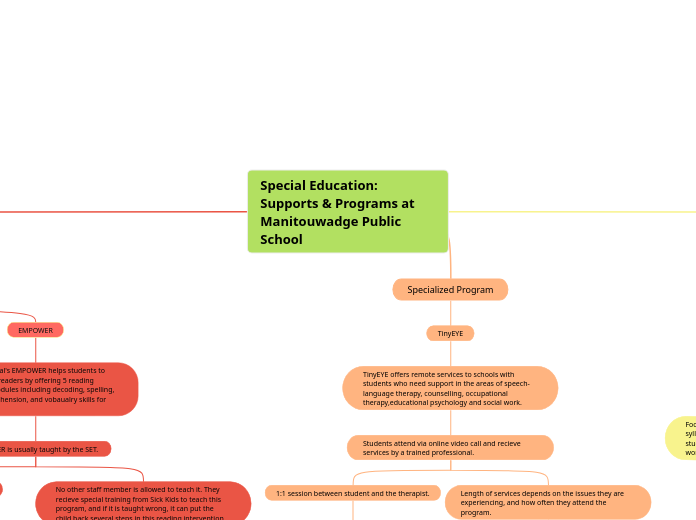arabera Sherry-anne Bryant 1 year ago
249
Special Education: Supports & Programs at Manitouwadge Public School

arabera Sherry-anne Bryant 1 year ago
249

Honelako gehiago
Phonemic awareness, reading fluency, and decoding words.
Used Daily for 30 minutes - 1 hour.
Teacher and/or EA can use UFLI with struggling student.
https://ufli.education.ufl.edu/foundations/
Used when student gets frustrated, bored, overwhelmed, ect.
I learned about brain breaks in my college course ES302.
Listed on IEP
Can be used by teacher or EA.
Can be used for class, or individual students.
Used by teacher and/or EA.
Can be used on entire class, or indivdual student.
Can use when students have excess energy, are frustrated, and overwhelmed.
Some movement breaks include Go Noodle, Yoga, Just Dance, a walk in the hall, antiseptic bounce and more.
Can be listed on IEP
Ususally used with an individual student, but can be used with the whole class.
Listed on IEP and safety plan.
Examples are timers, visuals, verbals, and more to help with transitions.
Teachers and EAs can help students with transitions.
Open court is used every day for about 30 minutes.
https://www.mheducation.com/prek-12/program/microsites/MKTSP-THA19M01.html
Focuses on phonemes, decoding, sounding out, syllables, and more. It is used with books to help the student apply what they have learned to the written word and improve oral fluency.
Used by teacher an/or EA
Usually used as curriculum to teach entire class to read.
Used as a reading intervention for individual students who are struggling.
Listed on IEP.
Students attend via online video call and recieve services by a trained professional.
Length of services depends on the issues they are experiencing, and how often they attend the program.
https://tinyeye.com/about-us/
1:1 session between student and the therapist.
EMPOWER is usually taught by the SET.
No other staff member is allowed to teach it. They recieve special training from Sick Kids to teach this program, and if it is taught wrong, it can put the child back several steps in this reading intervention.
EMPOWER can be taught to individual students or in groups of students who are at the same reading level.
Listed in IEP.
Taught daily for 30 minutes to an hour.
https://www.sickkids.ca/en/learning/empower-reading/
U.P. is applied anytime throughout the day, as many times as needed, to help a student regulate their behaviours.
Listed in IEP and Safety Plan
O.T's or staff who are trained by the O.T. can do these stretches.
Helps with muscles that are not used properly and are likely to atrophy without these stretches and also for posture.
We are a ruarl school, so George Jefferies, a service provider who offers P.T. and O.T., come in once a month to work with our students, their EAs, and meet with the teachers and principal.
They have also trained some of the EAs in our building to be able to do the stretches for the remainder of the month. and others to help him with all his daily functions.
https://georgejeffrey.com
The students in our school who use the Snoezelen room are not to use it when their behaviour is escalated, this is not what it is for.
It is used to help calm their sensory systems and not a reward for escalated behaviour.
Syudents spend 30 minutes a day in the room, with an EA outside the room, but in eyesight.
https://snoezelen.info/benefits-and-applications/
Being along in the room allows them t o calm themselves completely.
Students with autism, brain injury, behaviour challenges, and more use the Snoezelen room.
The Picture Exchange Communication System is used to help communicate with non-verbal students, and for non-verbal students to communicate with those around them with the use of pictures.
Most of our teachers and EAs in the school have a few cards on their lanyard.
An X card indicates the word no, or no thank you. A checkmark on a card indicates yes. A mouse on a card indicates quiet or quieter please.
Thse cards can be used in the class, or anywhere in the school.
In the form of a book where they can choose pictures to create sentences showing what they want or need.
In the form of a few cards on a staff members lanyard to communicate to the student what the staff members needs of the student.
PECS is used all day at school and usually at home too.
Listed in IEP